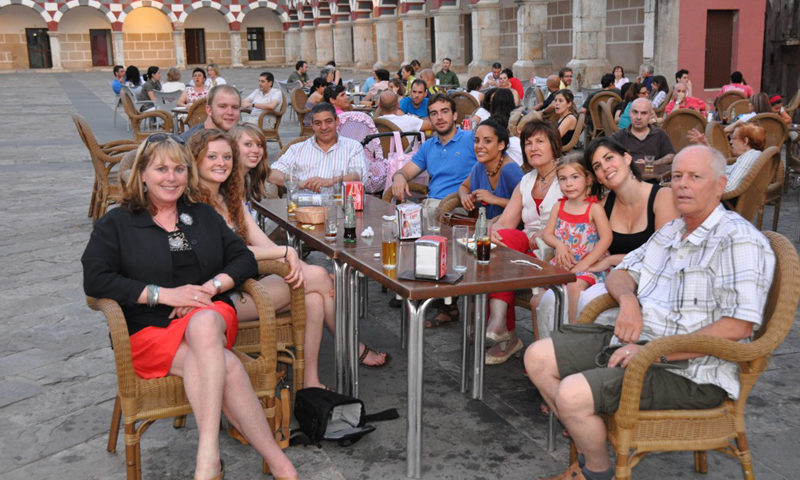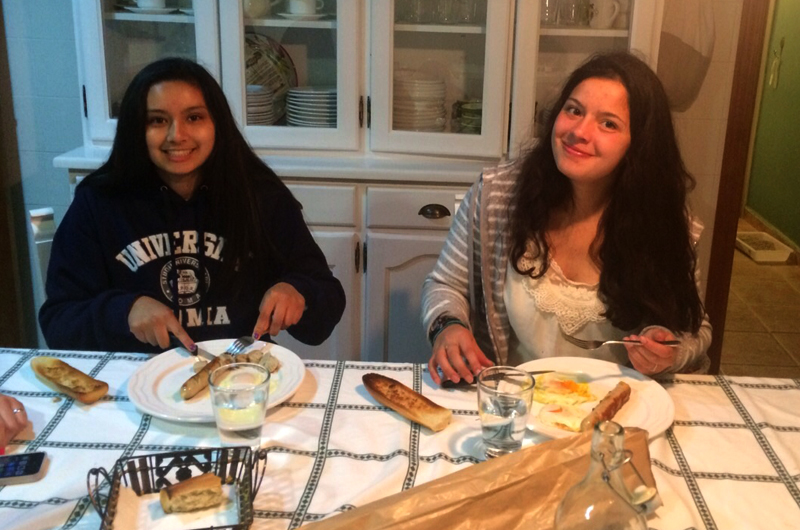What It’s Like Living with a Spanish Host Family

I’m not going to tell you what I’ve been up to lately in this post. Instead I’m going to go into some depth about things that I haven’t spoke about before mainly two things: Spanish Social life and host families. They’re both things that I thought I was prepared for but I wasn’t.
Spaniards are Social
“Spanish social life” and “Spanish life” are pretty interchangeable terms. Having friends and going out is incredibly important to Spaniards. I had only been here a few days before people started asking me questions like “do you have friends? Are you making friends? Do you go out with them?” This surprised because I had been in this country for less than a week. I really didn’t know anyone. But there was this pressure to make friends and go out and do stuff with them. I mentioned this pressure to someone who works with Greenheart and they explained to me that success here and happiness is more dependent on the social connections you make. If you’re spending time with friends then people think you’re unhappy.
This may sound redundant but these are social people. They are always meeting up for coffee or going on walks together. If, by some chance, someone is alone then they are likely on the phone with someone or planning to meet up later. In my small town it feels like everyone is connected- and they really are. Somehow everyone knows me. I’ve been walking down the street when someone goes “Hello Madison!” to me which is very nice and also a little confusing because I’ve never met them before. Social circles are big with lots of people plus other people who are parts of intersecting circles. This makes it hard at times because people are constantly coming and going. As someone who isn’t the best at names it sometimes feels like a test. At times I need to scan my brain to remember if I’ve met this person before, if we’ve introduced and if they’re related in someway to someone else. Formalities are quickly dropped after introductions (the which are done with a kiss on each cheek). People don’t shy away from terms of endearment like “hija” (daughter), “guapa” (beautiful) or “cariño” (dejar).

In the U.S. social life is important but it’s smaller. In the U.S. social get togethers are often held in your home. Here, that is very rare. If you’re meeting up with your friends then you usually do so in a bar. My friends will send me a message saying something like “9:30 en Cristos.” Then we’ll all get something to eat or sit down in a bar to talk or go to the “disco” (which sounds nerdy but it’s just a place with loud music, flashing lights and dancing, usually only young people go too.) This arrangement makes it easier for lots of people to to be together and come and go freely. Children tag along too, with their parents. They figure out their own fun in the bars and restaurants. It’s sometimes amazing how creatively they use their resources to make up games. To a person from the U.S. It can sometimes seem exhausting and chaotic. Like why can’t we just have a movie night? However, it’s a great position to be in as an exchange student because you get to meet a lot of people.
Living with a Spanish Host Family
All host families are different so by no means is what I say totally correct. Host families are exciting though. I remember the day I found out my assignment and the details of my family. I probably read their profile a hundred times. Then I emailed with them regularly in the months leading up to my arrival. But nothing can totally prepare you for living with them. For me I think there was a gap between expectations and reality. It was in no way negative though. When I thought of my host family I thought my host sisters would be like the girls I work with as a camp counselor. And I think my host family had some expectations too: that I’d be like all the other teenagers they know like their cousins for example. We both sort of forgot that we had never met. Making the first few weeks important for getting to know them. In many cases your host family is your first and best friends. They’re the people you can rely on and become familiar.
What I didn’t expect was how much of a family we’d become. A host family is not a group of perfectly posed group of models. They’re a family, they’re loud, they fight, and they have a good time. At first I felt like a very welcomed guest, only for a very short time, but I felt like an observer. Then I joined it, I became part of the family. I argue on occasion with my host sisters, I help with the chores and I found my place. My host sister feel the same way and unabashedly ask me a million question. Other exchange students have had the same experience. You aren’t always happy with your host family. How could anyone always be happy with the people they live with? However you become comfortable with everyone’s quirks and the pick up on yours. I would have missed out on so much if I hadn’t lived with a family here. Being part of a family exposes you to a lot of the culture: the food, the daily habits, and generally experiencing culture through their eyes.
It’s important for me to appreciate all the aspects of the culture. It would be easy to focus on only certain parts of life here and shape my view around those. Instead of cropping the picture though I try to view it all. There are negatives of life here and even the positives can be viewed as negatives when you’re tired and feeling frustrated. The time here is limited which is both a gift and curse. When I face the things I don’t like I have the comfort of knowing I don’t be here for very long.

However this comes around to the positive side too. While having great experiences I always try to take a moment to really enjoy it because I don’t have a lifetime ahead of me here.

This sounds like such a precious experience! <3